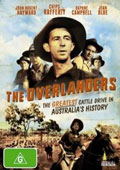
Directed by
Harry Watt
91 minutes
Rated G
Reviewed by
Bernard Hemingway

Overlanders, The
Before Paul Hogan became the iconic sun-bronzed Aussie there was Chips Rafferty, born John William Pilbean Goffage in Broken Hill in 1909, a long and lanky character actor who typified the fair dinkum bloke from Downunder during the 1940s and 1950s in Australian, much as John Wayne did the American cowboy during the same period.Here in his first major film role Rafferty plays Dan McAlpine, a plucky drover who with a Japanese invasion seeming imminent, puts together a team of helpers, including a family of farmers who have burnt their own homestead as part of a “scorched earth” policy along with a motley crew of adventurers and opportunists, in order to save 1500 head of cattle from summary execution. His unprecedented plan is to drive them from Wyndham in the north-west across the McDonnell Ranges to safety near Brisbane because in the war effort “bullocks are more important than bullets”.
The opening titles proudly claims The Overlanders as Britain’s Ealing Studio’s first Australian production. Part drama, part documentary it is a fictionalized version of an epic cattle drive that really took place in 1942. Made with the assistance of the Commonwealth Government, who supplied equipment, personnel and 1000 head of cattle to the visiting British film-makers, it was intended to raise the profile of Australia’s contribution to the war. It worked a treat and was a critical and financial success here and in the UK and USA.
Although the film suffers from being in black and white and thus losing a lot of the “sunburnt county” quality that needs colour to be communicated properly, the film, despite the influence of the Hollywood Western apparent in places, achieves a good deal of the authenticity to which director Watt aspired, with judicious use being made of the Australian vernacular and effective location photography giving us a real sense of the heroic adventure.
Understandably, Watts, who also wrote the screenplay, is decidedly Anglocentric in his film-making style. Hence Clyde Combo and Henry Murdoch who came from Palm Island were cast as the aboriginal stockmen, Jackie and Nipper, because Watt believed that the Northern Territory aboriginals did not speak English well enough. Similarly he embellishes the main subject matter with a sub-plot involving a quaintly polite romance between the farmer’s daughter and a young drover that to say the least is coy by today’s standards.
Particularly given the lack of experience of most of the cast, the film is best when concentrating on the main agenda although it does, interestingly, comment insightfully on both the state of the Aboriginal people and the despoliation of the environment by white settlement.
The Overlanders is a worthy legacy of the times, a significant addition to Australian cinema, and a film well worth catching up on.
Available from: Umbrella Entertainment
Want something different?





